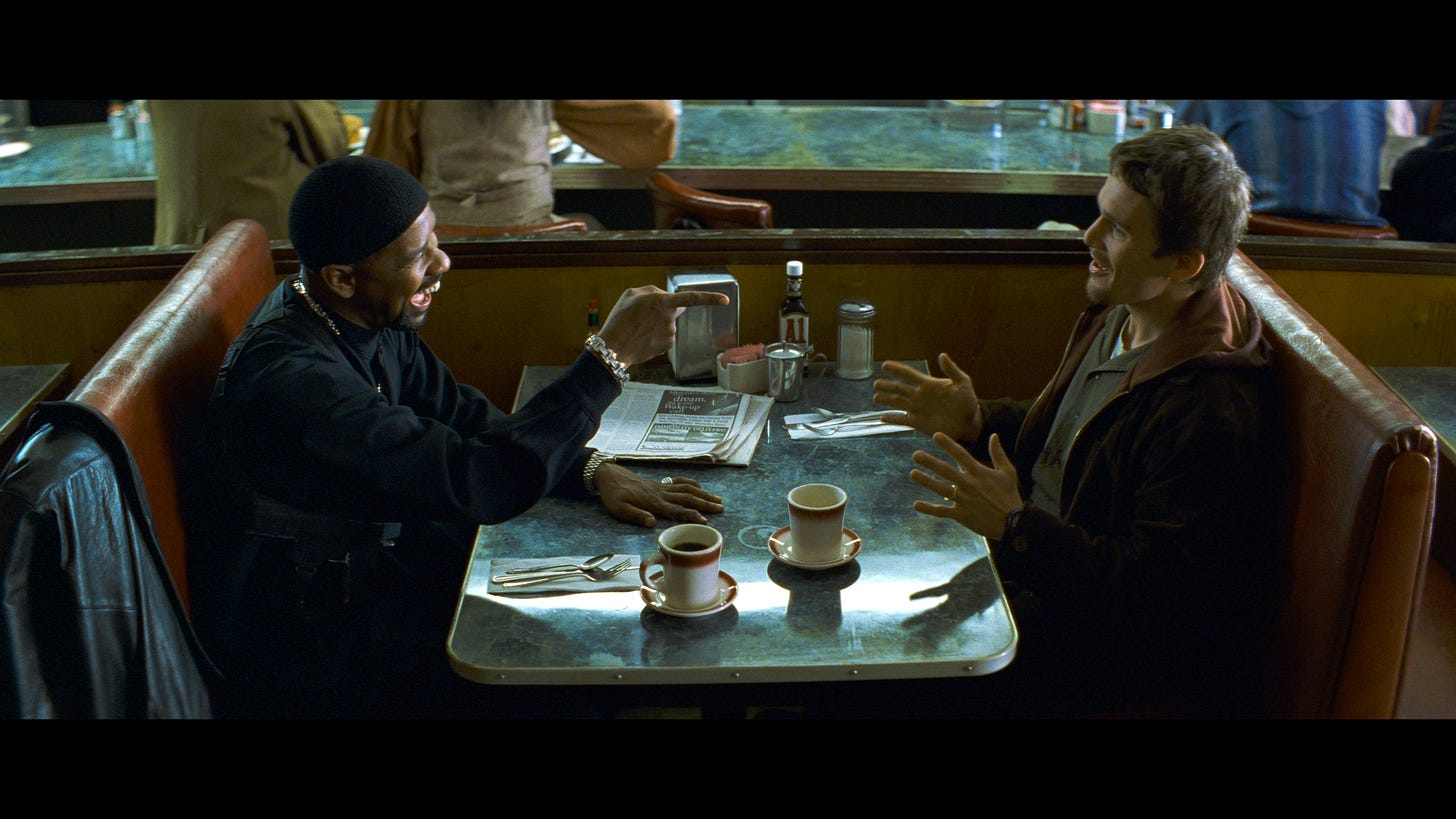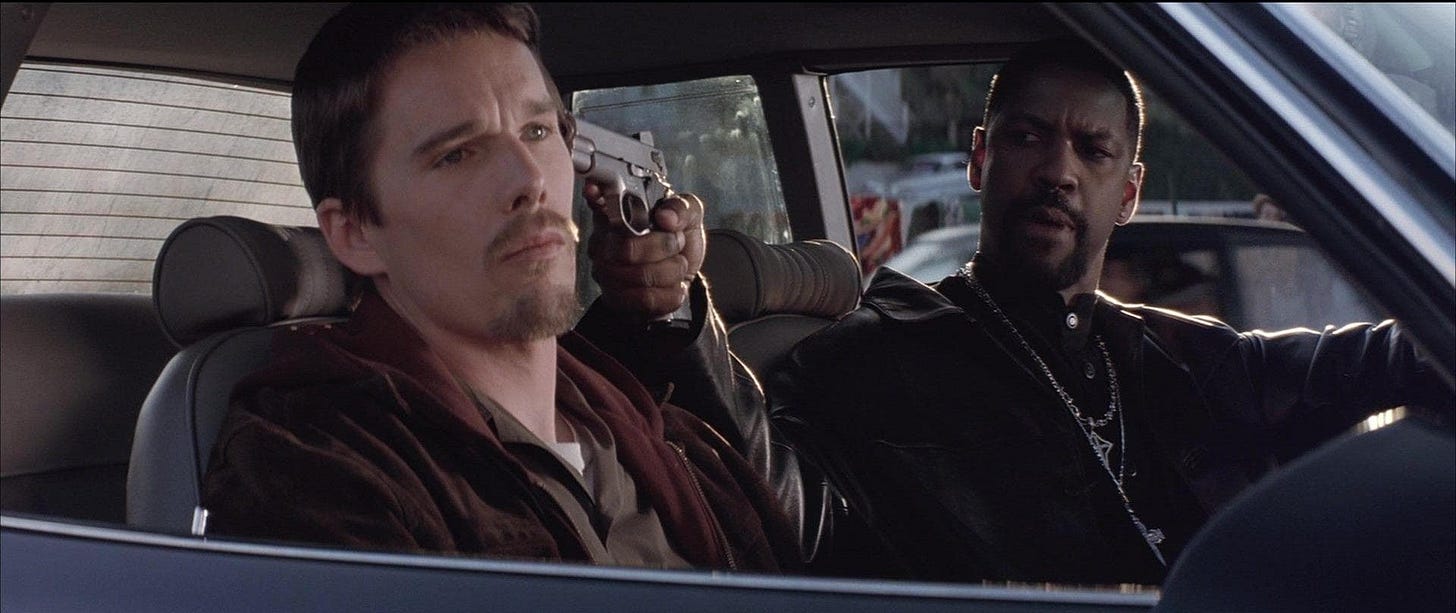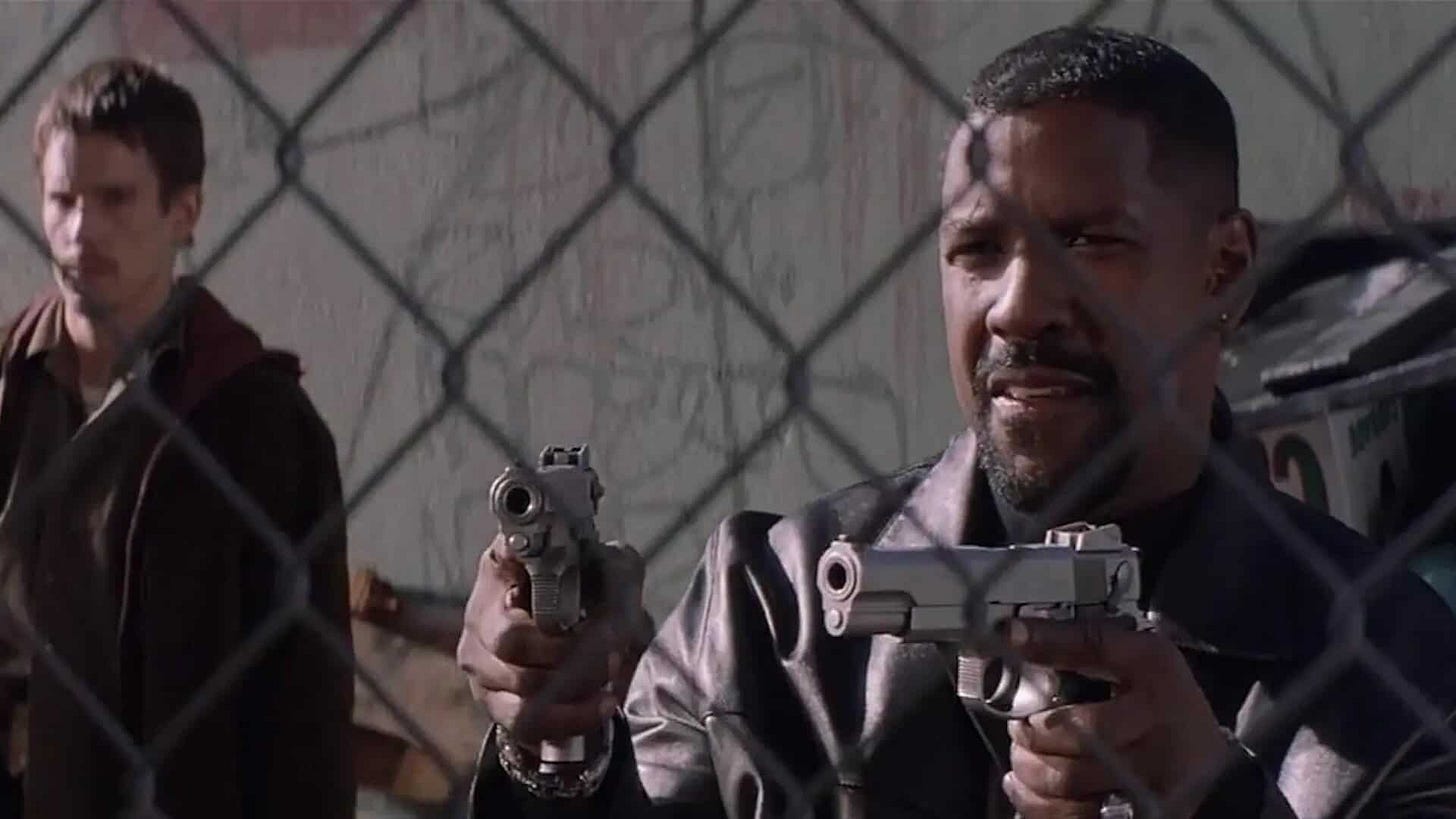For anyone who missed the last entry in the G.O.A.T. Villains series, you can check out numbers 22 (Ralph Cifaretto), 23 (Mola Ram), 24 (Clarence Boddicker) & 25 (Bohdi).
Entry no.25 also carries an explainer re: criteria.
Buckle up for No. 22… we’re about to go cruising through the hood…
To protect the sheep you gotta catch the wolf, and it takes a wolf to catch a wolf.
What could be more wicked than a bent cop?
And yet few Hollywood films feature an iconic villain sporting a badge on his chest.
Another Denzel Washington picture, American Gangster (2007), featured an effortlessley venal Josh Brolin in charge of a coterie of corrupt bootlickers while LA Confidential (1997), the James Ellroy novel superbly adapted by Curtis Hanson, showed the dark side of law enforcement.
Cop Land (1997) and The Departed (2006), released five years after Training Day, also had the police in their sights, but none featured a single antagonist as memorable or potent as Alonzo Harris.
Although the script was written before it was made public, the Rampart corruption scandal, which unfolded in Los Angeles during the late 1990s and early 2000s as the CRASH (Community Resources Against Street Hoodlums) anti-gang unit were suspected of a wide range of criminal conduct - leading to a number of convictions and even civil lawsuits against the City - inspired the film’s completion.
In fact, the working title was Rampart, but the studio bowed to political pressure and soon altered it.
Training Day was a hit upon release (even if it’s marketing campaign was badly hit by 9/11) but is largely known for earning Washington his first Academy Award for Best Actor.
It marked the first time he’d played a villain in his career. Before 2001 he had become a household name largely by playing heroes in films such as Philadelphia, Glory, Malcolm X, Remember The Titans and Crimson Tide, all of which helped the visceral impact of Training Day.
Samuel L. Jackson was originally touted to take on the role of Alonzo Harris, alongside director Davis Guggenheim and Matt Damon as officer Jake Hoyt.
Washington, however, requested a director change if he was to take on the project, and Antoine Fuqua came on board. It became a fruitful creative partnership, not least in the onwership Fuqua gifted the cast for each of their characters.
“He kept encouraging me” Denzel reavealed afterwards, “he would say: man some of the best stuff is the stuff you make up.”
While Noel Gugliemi, who played Hillside gang member Moreno, agreed on a podcast, saying Fuqua told the cast ‘don’t hold back’ and handed them the freedom to ‘make it real, gritty and raw.’
Our first hint of Alonzo Harris’ comes via training officer Jake Hoyt’s wife, whose face transforms from stern to coquettish when she answers the phone, hinting at the magnetism about to blindside her husband and the audience.
“Meet me at the coffee shop” Harris orders Hoyt “patrol fairies go to roll call. We don’t do roll call.”
If that cue wasn’t enough, by the time Harris and Ethan Hawke’s eager and impressionable Hoyt first meet, we’re all thrust into Alonzo’s world.
He doesn’t even look like a cop - bedizened in a black button up shirt and pants, overlaid with gleaming jewellery and black leather coat. A street superstar.
Who toys with the rookie.
Doesn’t even look at him when he enters, just keeps reading his paper before unleashing a vortex of attention and avoidance.
I’m going to get something to eat.
Oh no you wont. You fucked that up. I’m trying to read my paper. Please shut up.
Much of the scene was ad-libbed, and in the fertile spaces of the script Washington adds action and dynamics which elevate a sarcastic character to capitvating levels of condescension; the aggressive smile, the playacting by grabbing his guns when Jake, ordered by Harris, tells his story of a DUI stop.
“It was a real quiet night…” Hoyt begins.
“BOOM!”
He interrupts, laughing as Jake startles.
“You never know, that’s the point” he warns, instantly telling us all that we jump when he wants.
Harris is in complete control.
“My training officer, Debbie Maxwell -”
“Your T.O. was a female?” he lasciviates, damn-near licking his lips. His smile is innuendo, his smile is objectification, his smile is somehow still disarming, but, like Jake, none of us know whether to laugh, or whether to be worried.
Jake becomes intensely vulnerable in the bosom of it, as Harris flits back and forth without warning - assessor and commander, buddy and baddie.
The two-shot is striking - much of the ensuing action takes place side by side as they roll in Harris’ car, but here they are opposed in a subtle nod to future antagonism, the fallen angel and fresh-faced recruit.
You can’t ignore this devil/angel dichotomy. The film is full of references to Harris’ own naive beginnings. And part of what makes Training Day so spectacular, is the attempted degradation of Hoyt’s idealism by Harris’ grubby criminality and moral ambiguity.
He crushes Hoyt at the end of his DUI story.
Obliterates his confidence with a psychological sadism we’ve already seen glimpses of as he patronizes.
Boom. You got him. That’s amazing. It is. That you could be out there with a fine bitch for a year and the most entertaining story that you can come up with to tell me is a drunk stop. But I don’t believe you, you tapped that ass didn’t you?
Man I got a wife.
Even this last moment was not in the original script.
“You got a dick though,” says Alonzo. “Either side of it are two pockets, reaach inside and pay the bill.”
He bangs the table abruptly once more.
Jake is already paying, literally, for the privilege of being belittled. And no one watching, and certainly not Jake, has any clue what this man might do next.
Harris then challenges him to show him what he’s made of; whether he’s ‘got what it takes to be in these streets’.
It frames everything which ensues.
Dizziness is the essence of what Harris inflicts on Hoyt; a cat toying with a mouse. At turns playful and menacing, flipping on a dime from wildly animated and encouraging, to grave and urgent, homing in on the stress point’s of Jake’s nature, using guilt, fear and the ambition he admits to, to bend him to his considerable will.
Thereby stoking an enthrallment which metastasizes to disgust as the film goes on.
It’s god-like, Prosperian control, to reference Shakespeare’s character in The Tempest, whose role as a manipulator of events and characters is often interpreted as a reflection of the playwright’s own authorial modus operandi. And the degree to which Harris is beguiling, makes the repulsion all the more piquant when his mask slips.
But the triumph of Training Day beyond Washington’s Oscar-winning performance, is the way this curtain is pulled back by degrees.
Initially, you think Alonzo is sizing Jake up, wondering whether he has what it takes to survive in a world that is morally grey, but instead we later learn that his probings were far more sinister - the overt calculations of a spider leading a man into a well-laid trap.
And 10 minutes is all it takes for him to hit his jackpot.
“I will do anything you tell me to,” Hoyt promises.
Harris looks genuinely pleased. “My n*gga. Roll your window down and start there,” he says, before giving him a crash course in street science after he spots Hoyt’s wedding ring.
You got love coming out of your eyes. You've gotta hide that love, deep inside, you understand? Otherwise the streets will take it, and use it against you.
And we get a sense, perhaps, of how Harris fell so far.
Hoyt is given his first cause for alarm as they chase down some college kids trying to score.
Harris shows sadistic relish for the shakedown, twisting the driver’s ear savagely before asking for the pipe and threatening to ‘Let the homeboys up the hill run a train on your girlfriend’.
Hoyt glances at him uncertainly for the first time.
Alonzo is happy to threaten his victims with jail or the streets. And as far as the streets go, his eminency is there for all to see: traffic stops when he walks.
He even halts his car in the middle of an intersection to put a gun to his partner’s temple. Utterly unconcerned by the outside world - the beeping car horns and passers-by yelling - as he coerces Jake into smoking the pipe they confiscated.
Instantly gas-lighting him the moment he takes several hits: “Didn’t know you like to get wet though,” he chortles, suggesting that Jake knew it was PCP and not weed. Laughing as diabolically as a cartoon villain through Hoyt’s hazy, drug-induced reveries.
The hallucinations blur the line between reality and nightmare for Jake, between law and chaos; mirroring his descent to the dark heart of criminality and the injustices breeding in the hidden corners of the system he has sworn to uphold.
We feel his tension as the fog wears off and the small stories of Harris interaction with his environment begin to tally up to something monstrous.
It’s his former cop friend Roger, who really exposes Harris’ innocent beginnings though.
You were just like him. Same silly ass look and everything. Saving the god damn world.
Now we really see a fallen angel. Someone who has taken on the tone of his surroundings.
Director, Antoine Fuqua, said of the character.
He’s a guy who probably did some good when he started, but then realised if you just move a case an inch this way, you can actually get a case to stick. Then you start moving it a foot, then a yard, then next thing you know, you’re on the other side.
While Denzel added:
I think in some ways he's done his job too well. He's learned how to manipulate, how to push the line further and further, and, in the process, he's become more hardcore than some of the guys he's chasing.
Hoyt barrells out of the car after spotting a crime, even as Alonzo yells at him, marking the one moment in his machinations when his victim goes off-script, with huge conseqences.
At first, Alonzo merely watches on, smoking as Jake gets beaten trying to save a young girl from two junkie rapists - who screams that she’s connected to a Hillside latino gang - until Hoyt gets the upper hand.
He takes over, viciously - hitting a junkie in the windpipe, before menacing him with a knife.
And pulling his two Smith & Wessons.
“Pull your pants down” he orders, unscripted, before punching his victim in the balls and threatening rape once more.
“Do you wanna go to jail, or do you wanna go home?” Alonzo asks, not for the last time.
Jake is very concerned now. But in passing over an opportunity to hit the junkie himself, finds the young girl’s wallet, which later saves him, before remonstrating with Harris about his methods.
They got beat down they lost their rock they lost their money, them Ese’s from hillside probably gon’ smoke ‘em. What more could you want?
Justice
They got justice.
It’s street justice.
What’s wrong with that? To protect the sheep, you gotta catch the wolf.
But Alonzo soon has Hoyt howling.
It precedes an awareness of just how potent he has become.
Dipping through the hood in his black Monte Carlo, Harris isn’t just a policeman, nor something as tacky and ill-fated as a gangster, he’s above the law.
A force of nature.
A Hood King.
Local gang the Bloods, one of the most feared in all of America, flip pigeons just to let everybody know he’s around.
And genuflect.
Hoyt sees how Harris enjoys the sybaritic spoils of a regent. For beyond the gold chains and the diamonds, beyond the car and the money, we see his Queen, played by Eva Mendez, waiting on his every breath.
“We’re here to serve this warrant” Alonzo says as he seeks to rob drug dealer the Sandman when just his wife - played by Macy Gray - and kid are at home.
“We can’t do that,” Hoyt protests.
“We’re the police, we can do what the fuck we want to do.”
When local Crips get wind and start shooting, Harris is in his element. Utterly unfazed, biting his bottom lip in relish as he marches towards them, guns drawn.
“Decide. Wolf or sheep,” he urges Hoyt in the wake of it, showing him his tattoo as he wavers. “Get your ink.”
The message is clear: there is no turning back.
And Hoyt soon has to decide.
Harris, meanwhile, transitions effortlessly from the streets to a restaurant billowing with cigar smoke and white privelege. He’s still irreverent. Even if there are hints of his true malcontent - a debt to the Russian mob.
The mask comes off completely as he gets the warrant needed to legitimitize his murder of Roger and the theft of the money he covets.
“Breathe” he tell his friend after he’s decorated his midriff with buckshot, a smile hovering about his lips - finding piquancy in pain, and delight in domination.
Hoyt reacts as they try to ensure he’s complicit, and Harris reveals the true depth of his skullduggery in the narrative he’s been constructing, flagging the marijuana and PCP in his underling’s system as a potent means of blackmail.
“You been planning this all day?”
“I been planning this all week, son.”
In the standoff, Harris should be the weakest one in the frame. Hoyt has a shotgun on him, while Alonzo’s crew have all got guns on Hoyt.
Yet he’s still in charge.
He even has the chance to take Hoyt out - Dr. Dre’s character Paul wants him dead. But in a moment of hubris familiar to all villains, he declines.
In the aftermath of Roger’s execution, he thinks nothing of smiling at Jake and patting the roof of his car to beckon him in, even as he prepares the next step of his plan - Jake’s death.
“Make sure the tub is clean,” we hear him say, and wonder what it could possibly mean. Every moment in Training Day is a footstep taken towards Harris’ grand design.
It doesn’t take us long to find out what the intended denouement is.
But he still tries to wheedle Hoyt one last time, perhaps for his own conscience, by claiming Roger sold drugs to kids.“It’s chess it ain’t checkers,” he bellows, referencing his need to dissimulate.
“You guys are insane” Hoyt responds, lucid for the first time.
Still cloaked in the deception and gaslighting which has characterised his every interaction with the rookie, Alonzo then leaves him playing cards with a Hillside gangster called Smiley.
Smiley calls Alonzo a ‘hothead’ and reveals he beat a member of the Russian mafia to death in Vegas, meaning he needs to provide them with a million dollars, or his life.
The film shows us the fallibility of best laid plans, as the reversal hinges on one chance moment - Jake’s rescue of Smiley’s niece. Their discovery of her wallet in his pocket as they’re about to execute him, saves him.
And he goes straight for Alonzo.
In the ensuing shoot-out Harris doesn’t even flinch, never bends his body or even breaks stride.
Fear is nothing to him.
Nor love: Even his child is fair game to sacrifice for his own selfish ends.
Something Hoyt nobly prevents.
As if these villainous moments weren’t enough, Denzel could have got an Oscar for the ending alone.
Once again, a few meagre script lines hardly reflect the magic on screen. Fulminating at an entire neighbourhood after Jake disarms him - even hardened Bloods bleed fear in his presence.
“King Kong ain’t got shit on me!”, he yells at them in a moment improvised by Washington.
But no one takes his bait to murder Jake for money.
Their integrity places the Bloods and the neighbourhood above Harris.
Awwww, you motherf*ckers. Okay. Alright. I’m putting cases on all you b*tches! Huh. You think you can do this sh*t. Jake! You think you can do this to me?! You motherf*ckers will be playing basketball in Pelican Bay when I get finished with you! SHU program, n*gga. 23 hour lockdown! I’m the man up in this piece! You’ll never see the light of…..who the f*ck do you think you’re f*cking with? I’m the police, I run sh*t here. You just live here! Yeah, that’s right, you better walk away! Go on and walk away, ’cause I’m gonna burn this motherf*cker down. King Kong ain’t got sh*t on me!
“King Kong ain’t got shit on me?” says Fuqua, “It came out of him. We were there that night, he gets so into the zone, he walked over to me and said: I don’t know where that came from. I hope you got it. Cos that’s it.”
That was it.
Harris shows rare desperaton in screaming for Jake to return. The first chink in his armour, one which precedes his death.
It’s a virtuoso performance, a richly deserved Oscar-winning turn from Denzel: Few actors in history have contributed so much to one film. His raw charisma and stage presence amped up the conflict, heightening the drama and unpredictability of scenes, not only for the audience, but his fellow actors, who never knew what to expect.
Everybody dances to his tune.
And in the process he created a villain who will live forever.
Ironically, at the end, when Alonzo Harris stops at a red light, it’s the only time in the film he abides by the law.
And the Russians claim their bounty in a hail of bullets and blood.











